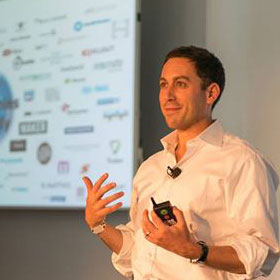Changes Brewing in San Francisco
Posted on .I was in San Francisco last week for a few days of meetings, and while I was there I heard more than the usual amount of grumbling from entrepreneurs about the engineering talent shortage in the city. Hiring software engineers is always hard, but there is an environment now where almost any engineer can raise angel money, and this has exacerbated the problem. It has even caused a new complaint to surface, which is that the “free agent” engineers who aren’t starting their own company (i.e. any engineer who would respond to a job posting) are either not good quality or are unwilling to work the long hours that were once the hallmark of successful SF startups.
There is also finger pointing that extends beyond the angel investors. Another common culprit is the actions of companies like Google, Facebook, Zynga, and Twitter. They have supposedly so coddled their employees with smorgasbord lunches and cushy job perks that everyone now expects similar treatment at other start-ups. As a result the expectations of typical start-up life have run amok.
I have my own theory on this topic. You see, I spent an hour at Twitter last week, which makes me an expert on this issue. In all seriousness, Twitter has no problem getting people to work long hours. They do offer a very nice breakfast, and probably have lunches in the office too, but nothing compared to the over-the-top Google cafeteria. I think that a handful of companies that are perceived as “solving interesting problems” or viewed as “high status SF firms” (i.e. Klout, FourSquare, Twitter, Facebook, Zynga) have gone a long way towards cornering the market on talent. I didn’t think it was possible, but it is a competitive job market out there and the value of the restricted stock/options at these companies is driving a serious gap between the haves and the have-nots.
There is one other explanation for this new talent divide in San Francisco, and I hesitate to mention it because I know some people will find it insulting, but I am going to bring it up anyway. The fact is that if you talk to a large law firm or a large investment bank, and you ask them if the SF office “works hard”, you will get an earful that the west coast guys are working half days compared to the New York office. That is not to say that everyone is checked out in San Francisco, but New York has long been known to have no knowledge of work-life balance, particularly in Finance. I think for the first time ever we are seeing software infrastructure companies built in New York, and these companies are often recruiting engineers out of the finance industry. It is becoming apparent how much more gets accomplished if you have a fleet of people working 100 hours a week on a product versus, say, 40 hours a week.
Regardless of the reason, it is an undeniable fact that companies are finding it hard to recruit engineers in Silicon Valley, and as a result many are resorting to outsourcing their engineering. At the end of the day San Francisco may be a victim of its own success, because the primary reason that people cite for starting a company in San Francisco is that you can find engineers there more easily. If that is no longer the case than the future will point to another city as the center of the Internet universe.

Ian Sigalow
http://sigalow.comIan is a co-founder and partner at Greycroft Partners in New York City. He has been a venture capitalist since 2001.
AUTHOR Justicewordlaw
Posted on 11:19 am June 20, 2011.
Wow I just learned some thing completely new. The comparison between San Fran and New York is a very good one as New York is known for their aggressive work ethic in about any thing. As I have read in a lot of articles good engineers are hard to come by it seems with these big companies offering very lucrative compensation plans and gifts.
AUTHOR matthew putman
Posted on 6:07 pm June 21, 2011.
I am still surprised that so many venture capitalists continue to debate over localization for finding talent, and doing business, as the technology world to me has expanded beyond the borders of New York or California due to cloud computing,new scripting languages etc. With that in mind I think that companies may need to take a new approach to recruiting engineers. Rather than looking to the already University Trained trained hacker (not sure why VCs such as Vinod Khosla insist on such a high Ph.D to BS ration), allowing programmers to come in with less experience, less salary, but equal creativity will have to become the norm. Though I don’t have an internet company, our microscope software company has mixed several ideologies, including training less experienced programmers. We have also hired people disillusioned with larger corporations, and sought talent in our home town of Akron Ohio, in addition to Silicon Valley and New York, where we have found creative engineers who have not had the opportunity to express themselves in a high tech environment.
AUTHOR DavidLarkin
Posted on 10:00 am June 22, 2011.
As you observe there are multitudes of engineers who have started their own companies, but most of them are either trying to generate lots of users, saving the moentization problem for an eventual acquirer, or are building features that complement a potential acquirers platform. In either case the actual revenue model is secondary. I think we need a new name for enterprises like that, I am not sure that “company” is quite the right word. When the bubble bursts, there will be a flood of talent released.